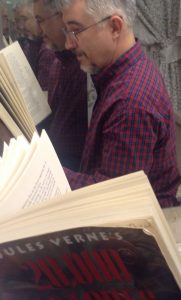Do you read the same book multiple times? If so, why, and what does that say about you?
 With Dr. Carl Sagan’s help, I’ve made the point before that the human lifespan is too short to read all books ever written. You can’t hope to read a tiny sliver of a percentage of them all. Therefore, time spent re-reading a book is time not spent enjoying a book you’ve never read.
With Dr. Carl Sagan’s help, I’ve made the point before that the human lifespan is too short to read all books ever written. You can’t hope to read a tiny sliver of a percentage of them all. Therefore, time spent re-reading a book is time not spent enjoying a book you’ve never read.
Re-reading a book is different from ordering the same meal at a restaurant or re-watching a favorite TV show or movie. Reading a book is a significant investment in time—many hours or days—repeating something you’ve already done.
At this point, you might ask, defensively, “So what? Since I can’t read them all, why not re-read a few I enjoy? And since it will take a few days, why not spend that time doing something I know I’ll like?”
Fair points. Also, I must say, you avid re-readers are in good company. Here are the thoughts of some famous authors on this topic:
- “Each time you re-read you see or learn something new.” Ernest Hemingway
- “There’s nothing wrong with reading a book you love over and over. When you do, the words get inside you, become a part of you, in a way that words in a book you’ve read only once can’t.” Gail Carson Levine
- “No book is really worth reading at the age of ten which is not equally – and often far more – worth reading at the age of fifty and beyond.” C.S. Lewis
- “An unliterary man may be defined as one who reads books once only. . . . We do not enjoy a story fully at the first reading.” C.S. Lewis
- “No book is worth reading that isn’t worth re-reading.” Susan Sontag
- “If one cannot enjoy reading a book over and over again, there is no use in reading it at all.” Oscar Wilde
Reddit has an interesting discussion of this topic. Commenters cited several different reasons to re-read. Some just found it comforting. A few re-read a favorite book during the same month every year, and associated that time of year with that book.
Over at Melissa’s Book World, Melissa says she falls in love with favorite books and their characters. If forced to choose between never starting a new book again or never re-reading a book again, she’d choose never to start a new one, since she couldn’t bear to part with her favorites.
Sara Jonsson came up with 10 good reasons that we re-read, including some interesting rationales like “the movie adaptation is coming out,” and “you have a test on that book tomorrow.”
I’ve noticed the experience of reading a paper or electronic book visually is different from listening to an audiobook. It still counts as re-reading, but the experience is different.
From my research, it appears the prime reason to re-read is the comfort it brings, the familiarity of the known. However, it’s not completely familiar. It’s like trying to go back to your childhood home again, or trying to dip your toe in the same river. You can’t. The experience is different. The book hasn’t changed, but you have.
In subsequent readings, you know what will happen. You won’t have that same sense of wonder, that same eagerness for the action to advance. You have time to relish the clever foreshadowing, the subtle ways the author set things up for the climax, the techniques the author used to draw you in to loving the main character. You couldn’t have noticed these things the first time.
The difference is most stark when decades separate the initial reading from the re-reading. You’ve likely forgotten a lot, so re-reading may repeat some of the joy of a first read. Also, you’ve matured significantly; your interests and outlook have changed. You might dislike a book you once enjoyed, and say you’ve outgrown it. Or you may enjoy other aspects, less concerned with plot and setting, and more with characters, style, and theme.
I’d say reading is important, even vital. If you feel the need to re-read on occasion to sustain your love for the reading experience, then go ahead and re-read, especially books by—
Poseidon’s Scribe
